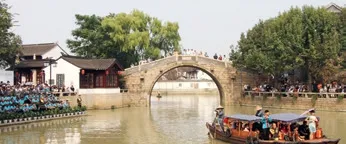Whimsical Thoughts on Translating Chinese Poetry
By David Ferguson
As neither a speaker nor writer of Chinese, I might seem like a surprising candidate to occasionally translate Chinese poetry. Chinese is completely different from English in structure.Reading Chinese certainly helps you appreciate the beauty of Chinese poetry, but I’m not sure it helps translation. You also need to know the words poets use, understand the intended meaning, and find a way to deploy the best words possible to communicate the meaning while retaining the sense of poetry.
While writing a book about the city of Suzhou, Jiangsu Province, I was working on a section on Hanshan Temple, which was founded by a famous monk Hanshan in the Tang Dynasty (618-907). Among the reasons for its fame is that the temple is the setting of one of China’s best-known poems—() by poet Zhang Ji of Tang.

A contestant (bottom right with parasol) performs at a poetry recitation competition under the Maple Bridge in Suzhou, Jiangsu Province, in October 2018
The first line writes itself because it translates almost directly. It is beautifully evocative—even a non-Chinese speaker gets the sense of the poem in its original form from these two metaphorical images and one event. The only question to be answered was should “” be translated as “crow” or“raven.” On the face of it, “crow” was the better choice. “” on its own should probably be translated as “crow.” “Raven” has its own characters in Chinese. But I chose“raven” for the image. Crow are coarse and common scavengers; ravens are altogether grander birds. What would you call a beautiful woman with black hair? Crow-haired?Never! So…
,,
In the second line, I couldn’t find any way of fitting in the references to both “”(maple) and “” (river) or thinking of anything that came close to scanning. I couldn’t abandon “” as it is integral to the title of the poem, so “” had to go.“Maple boughs” sounds nicer than “Maple trees” or “Maple Bridge.” In the book version it’s “Maple boughs and a fisherman’s lamp,”but I’ve now taken out the word “and.” The two images are not logically connected, and a comma slows the line down and creates a slightly better sense of random associations of thoughts on the part of the melancholy scholar.
,;
“Outside the Gusu City wall” pretty much writes itself. However, with the second half of the line, a decision needed to be made: Should it be “Cold Mountain Temple”or “Hanshan Temple?” “Gusu” is the ancient name of Suzhou City, so for balance“Hanshan,” the Chinese word and the name of the monk who founded the temple, should be used also. How great a word is “knell?”For a start, it rhymes with “bell.” And it works as a noun or a verb, so it gave me options. Best of all, it’s the right word. “Peal”is the wrong word. Carillons of bells peal on happy occasions. “Knelling” is a much more melancholic word.

,
Moving on to the last line, I chose “barge”rather than “boat” for scansion—“barge’s”gave me two syllables—and also because to navigate the canal, the scholar’s craft would surely have had a shallow draft and little or no keel—what we would call a barge rather than a boat. The last decision I had to make was “bell” or “bells.” “Bells” is a perfect rhyme but I was pretty sure that there would have been only one bell at Hanshan Temple.Which would have resonated more with my melancholy scholar—the chiming of a peal of bells, or a single mournful tolling? There was no doubt in my mind as to the answer.
,BR

